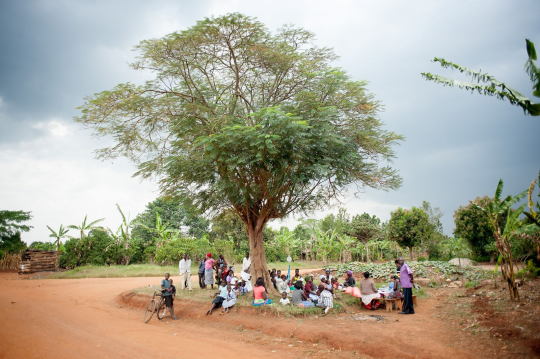Mothers gather under a tree to have their children vaccianted in Kyamulibwa, Uganda. Photo: Will Boase/RESULTS UK
Amy Whalley, Head of Policy Advocacy at RESULTS UK.
Sat on a mother’s lap under a tree, a baby cries out loudly and sharply. He doesn’t care about the surrounding crowd or the other twenty babies waiting and watching with their mothers. The most important thing he doesn’t know or care about right then is that his life has just been changed forever. He has just received a round of his routine immunisations. Painful though the injections might be, he is now much less likely to catch one of the many vaccine preventable diseases which still kill children every year in Uganda.
Last week I travelled to Uganda with three parliamentarians, Nigel Evans MP, Matthew Offord MP and Sarah Champion MP. We spent four days looking at how Uganda has been scaling up and improving the number of children who receive immunisations against many diseases including diphtheria, measles and polio before their first birthday. These numbers are going up year on year, despite the exponential increase in the number of children being born each year. Yet, there are still too many children missing out – 20% of Ugandan children don’t receive any vaccinations at all. That’s a massive 1 in 5.
During our visit we travelled to Kyamulibwa, a rural area just outside of Masaka, where we saw how the health system is being strengthened to reach every child. From immunisation sessions at the district health centre, to outreach sessions held under a tree in a village, to volunteers in every village who go house to house spotting illness and encouraging parents to vaccinate their children. The logisitics of getting the little vials of vaccine to each area, still useable and still cold is quite staggering. I was impressed by the commitment of everyone we met to make the scaling up and strengthening of immunisation services a reality – from the Minister of Health, to the members of parliament who championed the introduction of the Immunisation Act last year to the local civil society organisations who continue to advocate on behalf of those who aren’t yet able to access health services.

A community healthworker speaks with mothers at health centre in Kyamulibwa, Uganda. Photo: Will Boase/RESULTS UK
The improvements we saw were happening in Uganda would not have been possible without this level of political commitment twinned with financial support from Gavi, the Vaccine Alliance, and the UK Government. The UK has been a crucial supporter of Gavi and it was clear in Uganda how they work hand in hand with the Government to strengthen the ability of the national health system to provide an effective cold chain, making sure that every vial of vaccine is able to be kept cold and useable until it reaches the little boy beneath the tree in his village in the hands of a trained health worker.
It is indisputable that huge progress has been made in improving immunisation rates around the world over the past 25 years, saving millions of lives. However, we are often guilty of seeing that progress and those numbers and then assuming the job has been done. But for the 20% of Ugandan children who don’t yet receive any vaccinations that couldn’t be further from the truth. Now isn’t the time to move our attention away from immunisation, we saw in Uganda there is still a job to do and with continued political commitment and support we can change every child’s life.
This blog was originally posted on the RESULTS UK site here.






